EDUCATIONAL SYSTEM IN THE UK The education


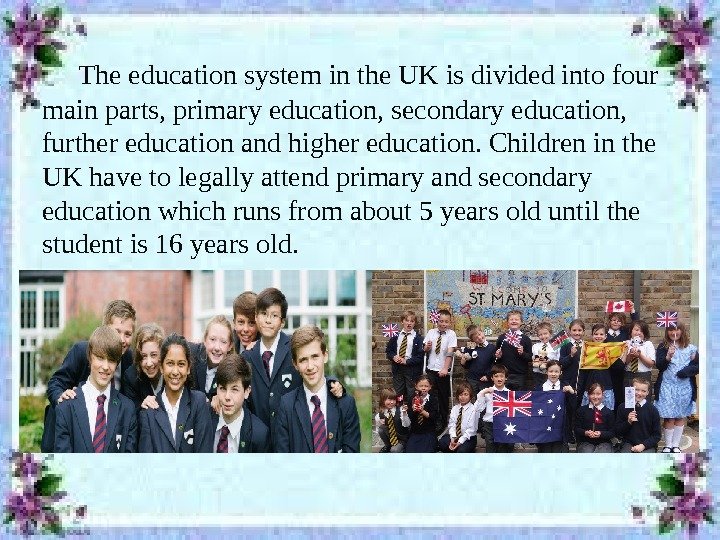
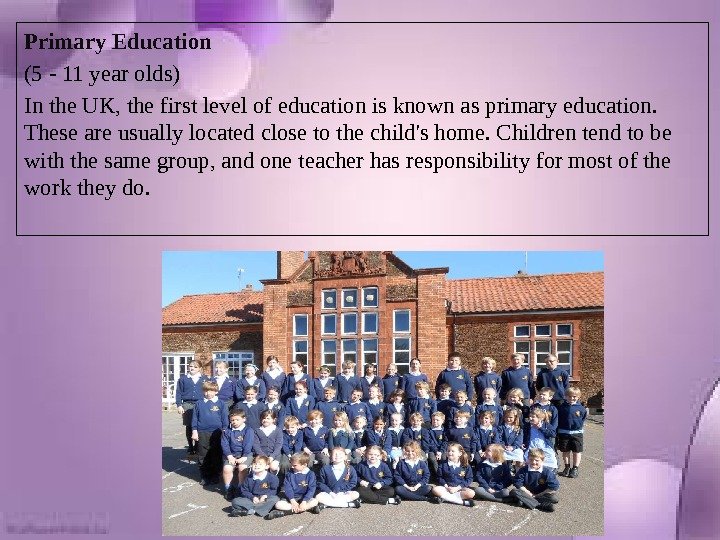
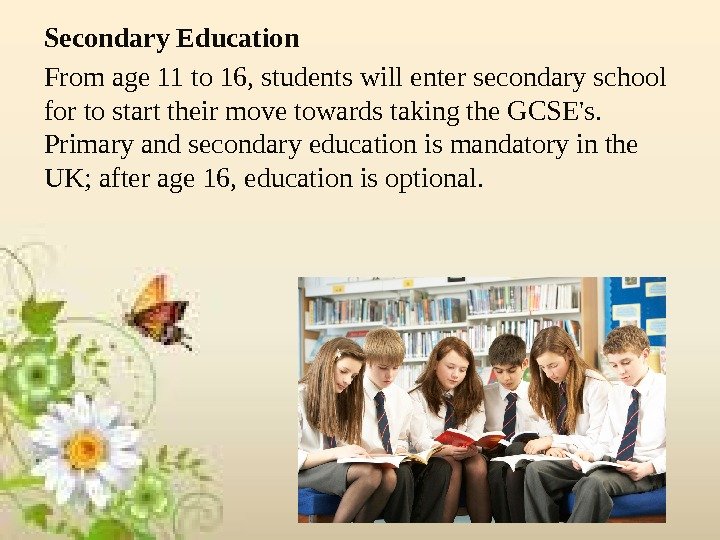
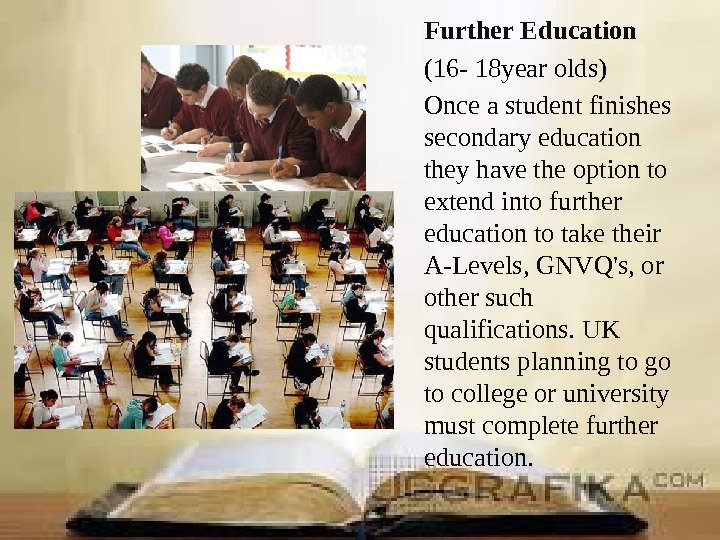
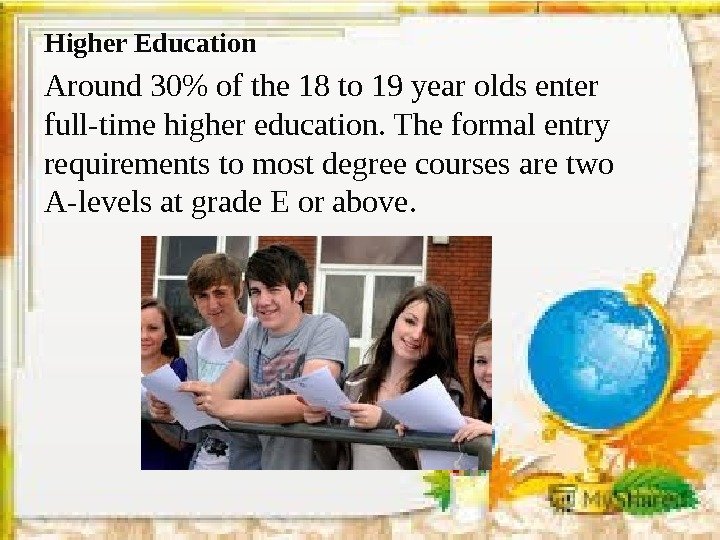
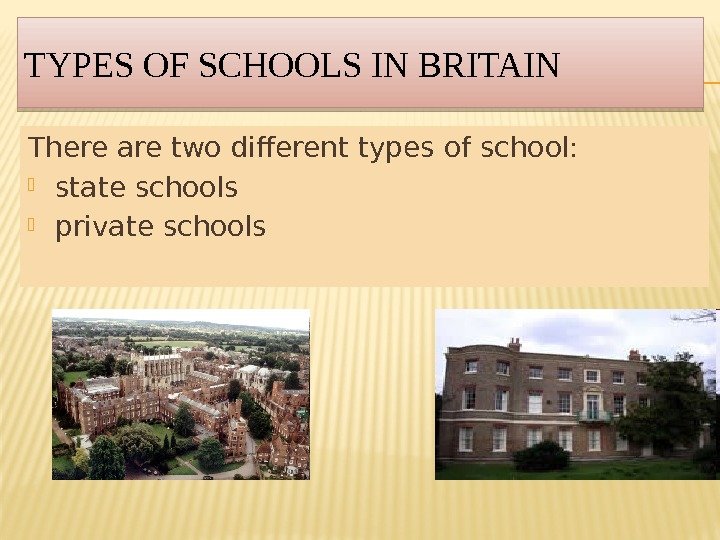
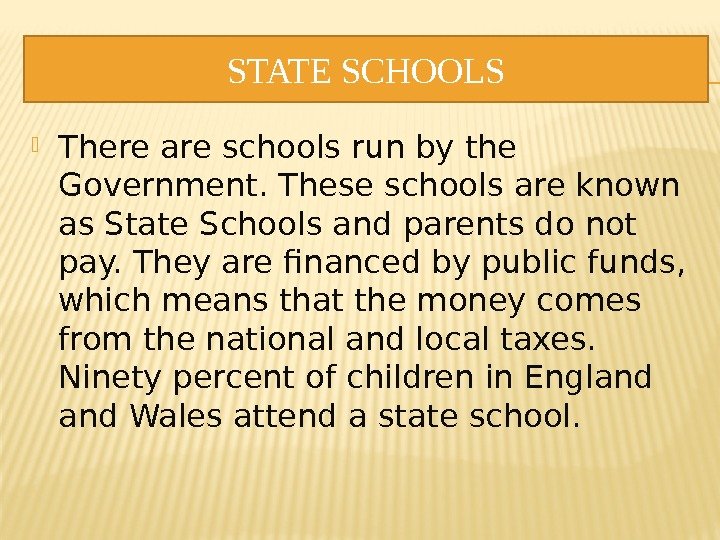


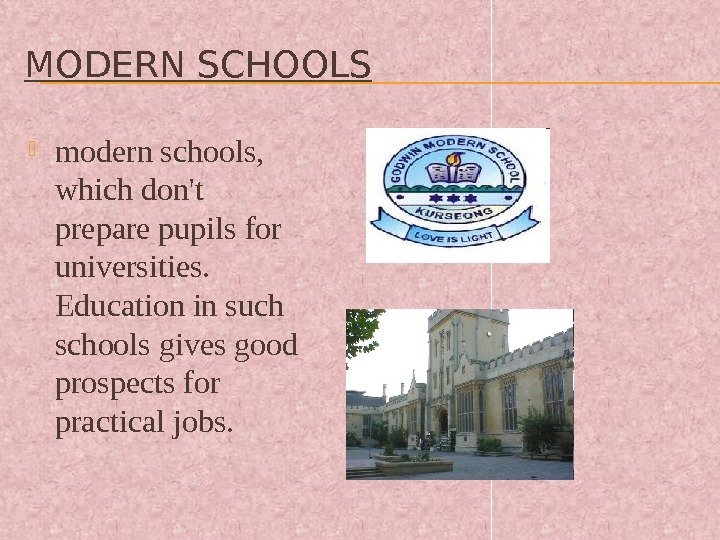
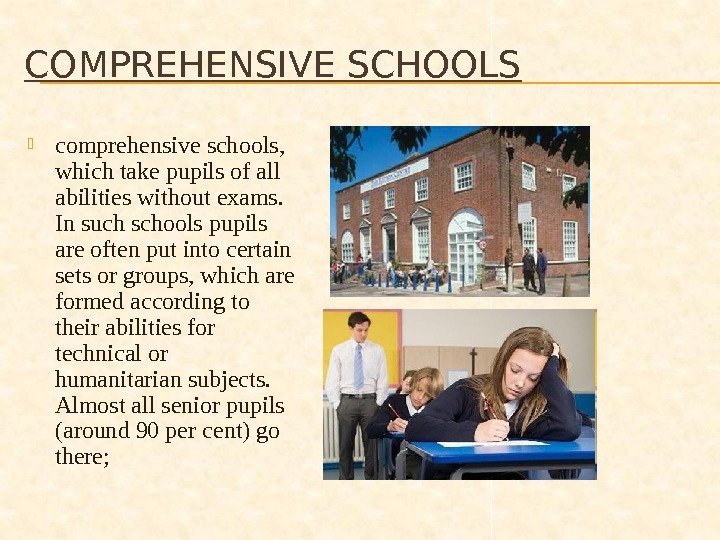
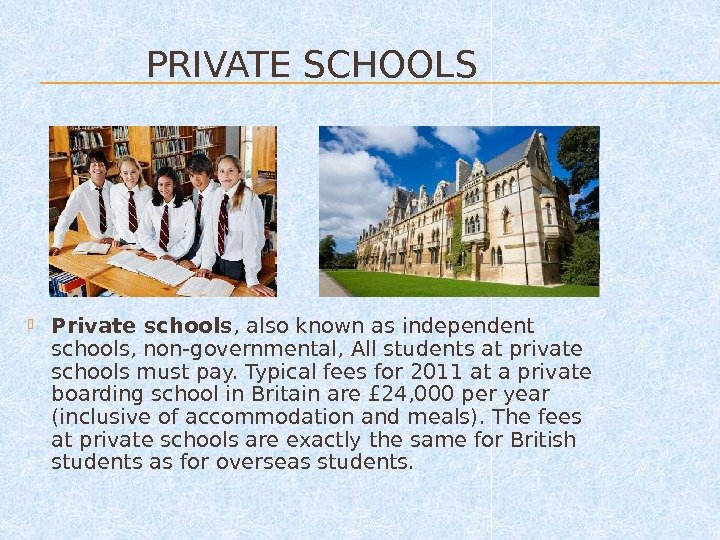
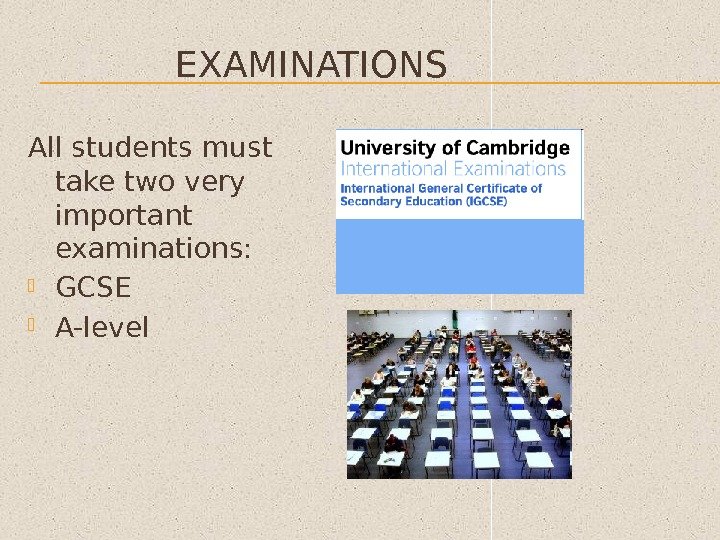
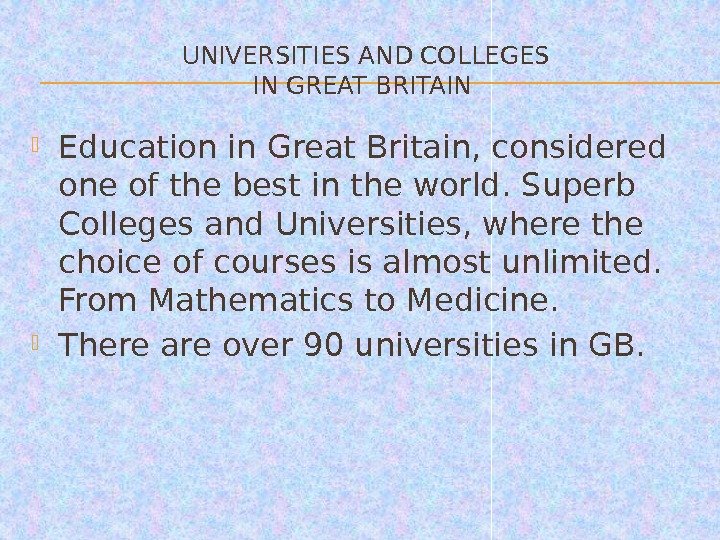
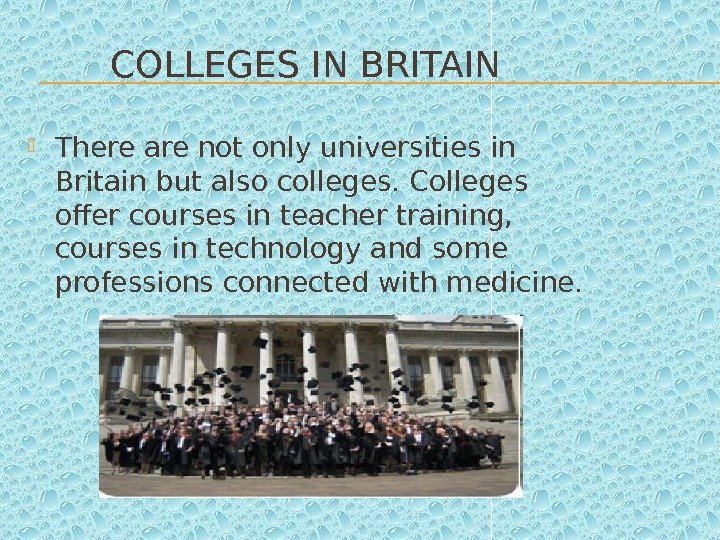
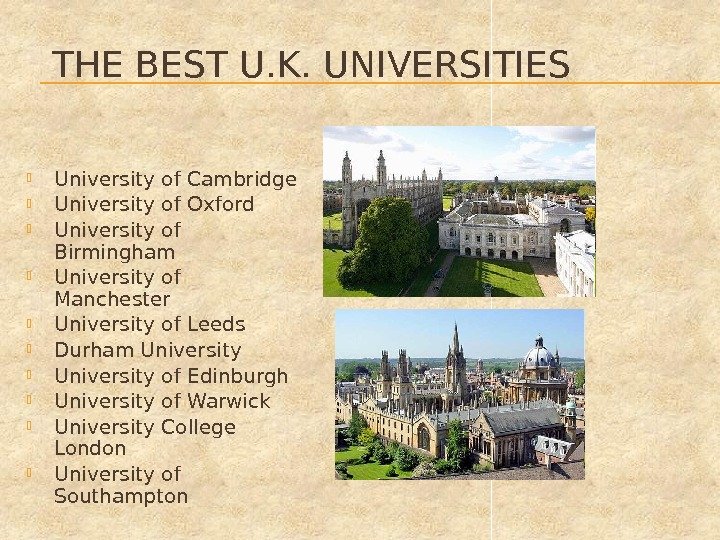

eltanu.pptx
- Размер: 8.7 Мб
- Автор:
- Количество слайдов: 18
Описание презентации EDUCATIONAL SYSTEM IN THE UK The education по слайдам
 EDUCATIONAL SYSTEM IN THE UK
EDUCATIONAL SYSTEM IN THE UK
 The education system in the UK is divided into four main parts, primary education, secondary education, further education and higher education. Children in the UK have to legally attend primary and secondary education which runs from about 5 years old until the student is 16 years old.
The education system in the UK is divided into four main parts, primary education, secondary education, further education and higher education. Children in the UK have to legally attend primary and secondary education which runs from about 5 years old until the student is 16 years old.
 Primary Education (5 — 11 year olds) In the UK, the first level of education is known as primary education. These are usually located close to the child’s home. Children tend to be with the same group, and one teacher has responsibility for most of the work they do.
Primary Education (5 — 11 year olds) In the UK, the first level of education is known as primary education. These are usually located close to the child’s home. Children tend to be with the same group, and one teacher has responsibility for most of the work they do.
 Secondary Education From age 11 to 16, students will enter secondary school for to start their move towards taking the GCSE’s. Primary and secondary education is mandatory in the UK; after age 16, education is optional.
Secondary Education From age 11 to 16, students will enter secondary school for to start their move towards taking the GCSE’s. Primary and secondary education is mandatory in the UK; after age 16, education is optional.
 Further Education (16 — 18 year olds) Once a student finishes secondary education they have the option to extend into further education to take their A-Levels, GNVQ’s, or other such qualifications. UK students planning to go to college or university must complete further education.
Further Education (16 — 18 year olds) Once a student finishes secondary education they have the option to extend into further education to take their A-Levels, GNVQ’s, or other such qualifications. UK students planning to go to college or university must complete further education.
 Higher Education Around 30% of the 18 to 19 year olds enter full-time higher education. The formal entry requirements to most degree courses are two A-levels at grade E or above.
Higher Education Around 30% of the 18 to 19 year olds enter full-time higher education. The formal entry requirements to most degree courses are two A-levels at grade E or above.
 TYPES OF SCHOOLS IN BRITAIN There are two different types of school: state schools private schools
TYPES OF SCHOOLS IN BRITAIN There are two different types of school: state schools private schools
 STATE SCHOOLS There are schools run by the Government. These schools are known as State Schools and parents do not pay. They are financed by public funds, which means that the money comes from the national and local taxes. Ninety percent of children in England Wales attend a state school.
STATE SCHOOLS There are schools run by the Government. These schools are known as State Schools and parents do not pay. They are financed by public funds, which means that the money comes from the national and local taxes. Ninety percent of children in England Wales attend a state school.
 STATE SCHOOLS ARE DIVIDED INTO THE FOLLOWING TYPES: Grammar schools Modern schools Comprehensive schools
STATE SCHOOLS ARE DIVIDED INTO THE FOLLOWING TYPES: Grammar schools Modern schools Comprehensive schools
 GRAMMAR SCHOOLS Grammar schools, which give secondary education of a very high standard. Entrance is based on the test of ability, usually at 11. Grammar schools are single sexed schools
GRAMMAR SCHOOLS Grammar schools, which give secondary education of a very high standard. Entrance is based on the test of ability, usually at 11. Grammar schools are single sexed schools
 MODERN SCHOOLS modern schools, which don’t prepare pupils for universities. Education in such schools gives good prospects for practical jobs.
MODERN SCHOOLS modern schools, which don’t prepare pupils for universities. Education in such schools gives good prospects for practical jobs.
 COMPREHENSIVE SCHOOLS comprehensive schools, which take pupils of all abilities without exams. In such schools pupils are often put into certain sets or groups, which are formed according to their abilities for technical or humanitarian subjects. Almost all senior pupils (around 90 per cent) go there;
COMPREHENSIVE SCHOOLS comprehensive schools, which take pupils of all abilities without exams. In such schools pupils are often put into certain sets or groups, which are formed according to their abilities for technical or humanitarian subjects. Almost all senior pupils (around 90 per cent) go there;
 PRIVATE SCHOOLS Private schools , also known as independent schools, non-governmental, All students at private schools must pay. Typical fees for 2011 at a private boarding school in Britain are £ 24, 000 per year (inclusive of accommodation and meals). The fees at private schools are exactly the same for British students as for overseas students.
PRIVATE SCHOOLS Private schools , also known as independent schools, non-governmental, All students at private schools must pay. Typical fees for 2011 at a private boarding school in Britain are £ 24, 000 per year (inclusive of accommodation and meals). The fees at private schools are exactly the same for British students as for overseas students.
 EXAMINATIONS All students must take two very important examinations: GCSE A-level
EXAMINATIONS All students must take two very important examinations: GCSE A-level
 UNIVERSITIES AND COLLEGES IN GREAT BRITAIN Education in Great Britain, considered one of the best in the world. Superb Colleges and Universities, where the choice of courses is almost unlimited. From Mathematics to Medicine. There are over 90 universities in GB.
UNIVERSITIES AND COLLEGES IN GREAT BRITAIN Education in Great Britain, considered one of the best in the world. Superb Colleges and Universities, where the choice of courses is almost unlimited. From Mathematics to Medicine. There are over 90 universities in GB.
 COLLEGES IN BRITAIN There are not only universities in Britain but also colleges. Colleges offer courses in teacher training, courses in technology and some professions connected with medicine.
COLLEGES IN BRITAIN There are not only universities in Britain but also colleges. Colleges offer courses in teacher training, courses in technology and some professions connected with medicine.
 THE BEST U. K. UNIVERSITIES University of Cambridge University of Oxford University of Birmingham University of Manchester University of Leeds Durham University of Edinburgh University of Warwick University College London University of Southampton
THE BEST U. K. UNIVERSITIES University of Cambridge University of Oxford University of Birmingham University of Manchester University of Leeds Durham University of Edinburgh University of Warwick University College London University of Southampton
 THANKS FOR YOUR ATTENTION
THANKS FOR YOUR ATTENTION

